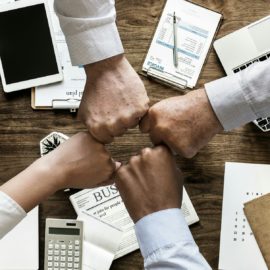

This article is an excerpt from the Shortform book guide to "Verbal Judo" by George Thompson. Shortform has the world's best summaries and analyses of books you should be reading.
Like this article? Sign up for a free trial here.
What difference does empathy make in communication? How can it help you de-escalate tense moments?
According to law enforcement trainer and English professor George Thompson, empathy is a powerful tool when you need to introduce calm into a high-stress situation. He presents empathy as a fundamental tool in the Verbal Judo toolbox.
Continue reading to learn about the importance of empathy in communication and how to use it to read people.
Empathy in Communication
The most basic tool for practicing Verbal Judo is empathy: the ability to understand someone else’s perspective, even if you disagree with them or their interpretation of the situation. In his book, Thompson discusses the importance of empathy in communication and shares some tips on how to use it to understand others.
Thompson explains that empathizing with the other person, no matter how unreasonable you might think they’re being, enables you to take the tension out of the situation. That’s because practicing empathy helps you give people what they want: to be understood. Demonstrating that you’re trying to understand what the other person needs and listening to what they’re saying can go a long way toward getting them to dial back their language, even when they’re still feeling angry or upset.
(Shortform note: Experts define empathy as the ability to understand someone else from their perspective rather than your own, which might look like understanding what they’re thinking, feeling, or experiencing. Psychologists Paul Ekman and Daniel Goleman say we have three kinds of empathy. Cognitive empathy gives us an intellectual understanding of what someone else is experiencing. Affective empathy helps us to feel what another person is feeling. Compassionate empathy combines the first two and helps you act on them to help the other person. In all its forms, empathy helps us understand others and figure out how to make them feel understood, a feeling that we all need in our lives.)
According to Thompson, empathizing with another person doesn’t just make them feel understood—it also helps you see their perspective and understand what they need from you. When you show that you understand the problem and are working toward a solution, the other person will feel reassured that you recognize how they’re feeling. For example, imagine you have to tell your team that a project they’ve been working on has been put on the back burner. Your colleagues might get upset, since they’ve worked hard to finish it on time. To practice empathy, you might acknowledge their work and their disappointment. By validating their feelings, you reduce the tension in the room, even though everyone still feels disappointed.
(Shortform note: Thompson isn’t the only expert to emphasize how important it is to make sure other people know you’re trying to see things from their point of view. Effortless author Greg McKeown contends that instead of just trying to understand someone, you should also work to help them feel understood. He explains that listening with this goal in mind can help you connect with someone and make them feel seen and validated.)
| How Does Empathy Affect How Police Officers Communicate? Thompson may have been ahead of his time in giving empathy such a prominent place in Verbal Judo. Experts say it wasn’t until after the 1992 discovery of mirror neurons—which activate when we take an action and when we watch someone else taking that action—that people began to recognize that empathy is more than an emotion and plays a critical role in helping us understand each other. Research is even beginning to show that it’s useful specifically in police interactions, too: When police departments encourage more empathetic ways of communicating, it helps officers slow down, use force less often, and build trust with the communities they serve. That said, some experts argue that relying on empathy in our interactions with others has drawbacks. Against Empathy author Paul Bloom contends that because we empathize more with people who are similar to us, empathy can make us more likely to discriminate against those who are different from us. Implicit biases affect our thinking and behavior even when we believe in equality and intend to be fair, which is why police officers often undergo implicit bias training. But research shows that these programs don’t seem to reduce racial biases in policing, which illustrates how persistent these biases are and how hard it is to stop them. |

———End of Preview———
Like what you just read? Read the rest of the world's best book summary and analysis of George Thompson's "Verbal Judo" at Shortform.
Here's what you'll find in our full Verbal Judo summary:
- How to handle any tense situation calmly
- How you can persuade even the angriest person to cooperate
- The three most important verbal judo principles






